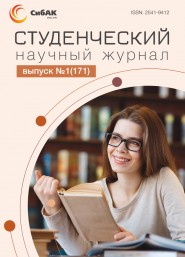Статья опубликована в рамках: Научного журнала «Студенческий» № 1(171)
Рубрика журнала: Филология
Секция: Литературоведение
Скачать книгу(-и): скачать журнал часть 1, скачать журнал часть 2, скачать журнал часть 3, скачать журнал часть 4, скачать журнал часть 5, скачать журнал часть 6, скачать журнал часть 7, скачать журнал часть 8
ORGANIZATION OF EXTRACURRICULAR WORK ON LITERATURE WITH THE HELP OF MODERN TECHNOLOGIES
ОРГАНИЗАЦИЯ ВНЕКЛАССНОЙ РАБОТЫ ПО ЛИТЕРАТУРЕ С ПОМОЩЬЮ СОВРЕМЕННЫХ ТЕХНОЛОГИЙ
Титенко Алина Александровна
студент, кафедра русского языка и русской литературы, Белгородский государственный национальный исследовательский университет (НИУ «БелГУ»)
РФ, г. Белгород
ABSTRACT
This article discusses the issues of the organization of extracurricular work on literature with the help of modern technologies.
АННОТАЦИЯ
В данной статье рассмотрены важные для современной образовательной системы вопросы организации внеклассной работы по литературе при помощи современных технологий.
Keywords: extracurricular work, modern technology, information technology, literature, training.
Ключевые слова: внеклассная работа, современные технологии, информационные технологии, литература, обучение.
Extracurricular work in the educational organization performs a crucial role in order to ensure the achievement of the planned personal and meta-detective results of the development of the student's main educational program at all levels of the general education of educational organizations of the Russian Federation. Its main feature is the voluntaryness of visiting students in accordance with their personal interests [1].
D.V. Grigoriev and P.V. Stepanov believes that the teacher "makes up a plan in accordance with the interests, requests and desires of students, as well as taking into account the community-wide annual plan. This is done for the fact that the students were brought up in a striving for self-improvement, could have been able to independently replenish the knowledge and apply on their own experience" [2, p. 38].
An overview of scientific and methodological literature on the issue of research makes it possible to determine that modern technologies can be pedagogical and informational. Pedagogical includes technologies of multi-level learning, active forms of training, organization of training in the form of discussion, game, various types of training projects. Information technologies include information and communicative technologies, media technologies.
Modern technologies in the organization of extracurricular work on literature are activities that include implementation, on the one hand - various kinds of innovative educational technologies involving an innovative personal approach in training (interaction of students with each other, the development of the abilities of a learning self-education), and on the other - information-computer technologies (computer programs, technical means of learning).
In any case, extracurricular activities are aimed at achieving the overall goal of training and education - to master the student-important social experience in society and on the formation of a system of moral and moral and cultural values adopted by the society.
Theoretical analysis of the approaches of researchers to the organization of extracurricular work allows you to allocate its content, features and requirements of the implementation.
Forms, methods and techniques of extracurricular work are used in the implementation of pedagogical conditions in the development of a set of extracurricular work on literature using modern technologies. Specially organized extracurricular work using innovative technologies at school in the study of literature contributes to the formation and development of students' creative and research skills, improving the quality of knowledge.
A.P. Schmakova proposes to take into account the fact that information technologies "serve not only for a variety, but also in order for the training material to be visually understandable and interesting" [4, p. 31].
Thanks to the visibility and interactivity of information technology, schoolchildren are faster and deeper in the essence of the task, the time to study a certain material is saved, which allows you to pay more attention to the learning of new knowledge [3, p. 45].
The most famous and frequent type of extracurricular work is a training circle. Application in the process of conducting classes in the circle of visual materials, as well as independent work of students and personal qualities of the teacher contribute to the emergence of interest among students in literature. In order for the cognitive interests of students to develop, it is necessary to create a supportive environment that can stimulate the creative work of students who can promote them not only in obtaining new knowledge, but also the development of cognitive skills, mastering the observation, the ability to experiment, expand the perception, formulating shaped tasks.
Thus, modern technologies in the organization of extracurricular work on literature optimally allow the teacher to present, and the student - to acquire skills and skills in the educational process. When building a system of extracurricular work, it is necessary to take into account the consecutive stages, starting with the diagnostic, goal-setting, detailed modeling of the system, analyzing the work carried out and the formulation of promising tasks.
References:
- Federal State Educational Standard of Middle General Education (approved by the Order of the Ministry of Education and Science of the Russian Federation of May 17, 2012 No. 413) [Electronic resource]. – URL: https://base.garant.ru /70188902/8ef641d3b80ff01d34be16ce9bafc6e0/ (date of the application: 25.12.2021)
- Grigoriev D.V. Extracurricular activity of schoolchildren. Methodical Designer [Text]: manual for teachers / D.V. Grigoriev. – Moscow: Enlightenment, 2011. – P. 224.
- Markova A.K. Formation of the motivation of teaching at school age [Text]: manual for teacher / A.K. Markova. – Moscow: Enlightenment, 2014. – P. 96.
- Shmakova A.P. Formation of the readiness of the future teacher to pedagogical creativity of information technologies [Text]: monograph / A.P. Shmakova. – Moscow: Flint, 2015. – P. 288.


Оставить комментарий